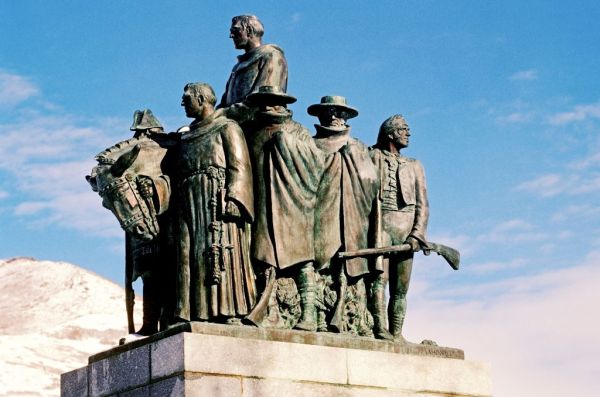The fashionable way for any writer from a minority background to recall their life story these days is to tell the reader about how hard things were—how they were bullied in school, denied jobs and other opportunities, and how their family business was covered in hateful graffiti.
But that really wasn’t my experience at all. I grew up as the son of two Pakistani Muslims in the Deep South. Occasionally I ran into some bozos here or there, but for the most part, I felt welcome and at home. People often asked me where I was from, but that just gave me an opportunity to tell them a much more interesting story than they might have expected.
That was even true after 9/11. I remember my dad telling me that one of his friends, a white Southern guy who I’m sure marked his ballot for Bush-Cheney, came up to him and told him that if anyone messed with us, we should come to him first. He would take care of it.
This was life for me growing up in a conservative region of the country. There were many issues where I didn’t see eye to eye with my friends and neighbors, but I was optimistic about my place in the country. Racism and bigotry were real problems, but increasingly I saw them as situated in the rear-view mirror. Even when I did run into frustrations—the first big one being in high school, when I watched my country invade Iraq under flimsy pretenses—I told myself that things wouldn’t always be this way. My recently launched newsletter, The American Saga, is all about learning from our mistakes and getting better.
We’re not a perfect country, but we’re constantly improving.
That’s why my heart sank when I watched much of the right work itself into a frenzy this past week over the presence of Haitian immigrants in the town of Springfield, Ohio. The entire episode reminded me of the moral panics earlier in American history—of nativist hysteria that targeted Jews, Catholics, Italians, and others who did not perfectly match the image of the White Anglo-Saxon Protestants that settled this country.
For those who aren’t familiar, it all started like this: In early September, the New York Times covered the immigration debates in Springfield in a nuanced piece that dove into the dynamics at play there. For years, Springfield's population had been dwindling, and its economy had struggled. Starting around 2014, the town decided to try a rejuvenation strategy: It worked with other Rust Belt communities to encourage more people from around the world to move there.
The latest wave of these immigrants were Haitians. As the Times reports in its lengthy piece, the influx of an estimated 20,000 Haitians and other immigrants helped revitalize the town’s economy. “They come to work every day. They don’t cause drama. They’re on time,” Jamie McGregor, who runs a family-owned metal business in the town told the Times. But tensions soared after a tragedy last year, when a minivan barreled into a school bus in a traffic accident, and the driver happened to be one of the Haitian immigrants. Many in the town blamed not just the reckless driver but the entire Haitian community. “Not one person asked anyone in this community how we felt about them coming in here and invading our city,” one resident said of the Haitians at a town hall meeting in July.
As the Times noted, one of the immigrants’ most vocal critics was Republican Sen. J.D. Vance of Ohio. Speaking at the National Conservatism Conference in July—just a few days before being announced as Donald Trump’s running mate—Vance implored the audience: “Go to Springfield … and ask the people there whether they have been enriched by 20,000 newcomers in four years.”
Vance pointed to rising housing costs and health spending as problems in the area. I don’t know the ins and the outs of the economic problems associated with the rapid growth in the city, but state and local officials have been working on it.
Debates about immigration, assimilation, and the way American communities are changed by foreign-born newcomers are fair. What happened over the past few days, however, was not.
Earlier this week, Vance and other leading Republicans escalated their panic. They were no longer telling a story of a small town grappling with social and demographic change. Rather, they turned up the rhetoric, depicting a place where vicious invaders were destroying the American way of life, one animal at a time.
“Months ago, I raised the issue of Haitian illegal immigrants draining social services and generally causing chaos all over Springfield, Ohio,” Vance tweeted on Monday. “Reports now show that people have had their pets abducted and eaten by people who shouldn’t be in this country.”
It’s not clear where Vance got his reports, but the senator from Ohio is notoriously online. All over social media, right-wing sources had flooded the zone with claims that Haitian immigrants had stolen and eaten people’s pets—cats in particular. One of the sources for this claim was a video popularized by influencer Ian Miles Cheong (who lives in Malaysia). In that video, a woman is being questioned by police for killing and eating a cat.
But there were problems with that video. For one, it was shot in Canton, Ohio, not Springfield. More importantly, there’s no indication that the woman is Haitian—she has an American name. It’s not clear why she engaged in this act of animal cruelty, but if I had to guess, mental illness or drugs were the main culprits, not some foreign culture.
Then there was a photograph of a black man carrying what appears to be a goose. It was accompanied by rumors that Haitian locales are snatching up geese and ducks. I chased that photo down to a Reddit post from Columbus, Ohio, that was posted more than a month ago. The Federalist posted a phone call from a resident who says he saw individuals with geese, although county officials say it was the only such call they received in 11 months and found no evidence to support it.
These rumors were enough for senior GOP lawmakers to go all in. Texas Sen. Ted Cruz posted an image of two cats alongside the quote, “Please vote for Trump so Haitian immigrants don’t eat us.” The House Judiciary Committee warned that “Kamala Harris laughs while illegal aliens eat your pets.” Donald Trump himself put his own spin on Springfield, hysterically warning in his first televised debate with Harris that people’s dogs are now being eaten by the town’s migrants.
I’m not one of those people who says that Americans are required to fearlessly embrace any and all immigration. Again, it’s entirely fair to debate what kind of and how much immigration we want to allow. It is, after all, our country.
Most people are anxious when the world is changing around them. I remember living in Northern Virginia in 2020 when Confederate statues were falling and streets were being renamed left and right in the region. Even I, as someone who had zero connection to the Confederacy and no sympathy for its cause, felt a little uneasy having to learn new names for things I’d always referred to by another word.
I can’t imagine what it’s like being an older established person who grew up never meeting someone from another country and seeing your community start to look entirely different. Not only do people look different, they speak different languages, they have unusual customs, and you might even have to change things about your life to accommodate them.
Those of us who are relatively tolerant toward immigrants have to understand the perspective of these more conservative people because they’re our countrymen. We have only one America, and we have to learn to share it with people whose families have been here for generations and relative newcomers alike. Moreover, in a past life I worked in politics. I know that when it's campaign time, partisans on both sides are often overcome with a sense that anything is justified because you sincerely believe your party is better suited for governing than the other one. The ends justify the means.
But consider this: Millions of people now believe that immigrants are butchering their beloved cats and dogs. How will those people approach immigrants—or people they think are immigrants—if that’s what they believe? Are we setting ourselves up for another Buffalo or El Paso mass shooting?
Last month, a neo-Nazi group called Blood Tribe marched through Springfield. One of its leaders spoke at town council meeting there, decrying the Haitian “savages.” BloodTribe took to Gab—a far-right social network platform—and bragged three days ago: “No one else is more on top of what’s happening in #Springfield from the WN perspective than we are. Our boots are literally on the ground there weekly.” If they commit some horror, it wouldn’t be the first. In 2023, a Springfield man was arrested for hate crimes against Haitians, including robbery and assault.
Is this the conservatism I grew up with? Feeding into this? The leaders of the current Republican Party understandably want to win the election. But it’s less understandable to want to take the soul of the country down with them.






Please note that we at The Dispatch hold ourselves, our work, and our commenters to a higher standard than other places on the internet. We welcome comments that foster genuine debate or discussion—including comments critical of us or our work—but responses that include ad hominem attacks on fellow Dispatch members or are intended to stoke fear and anger may be moderated.
With your membership, you only have the ability to comment on The Morning Dispatch articles. Consider upgrading to join the conversation everywhere.